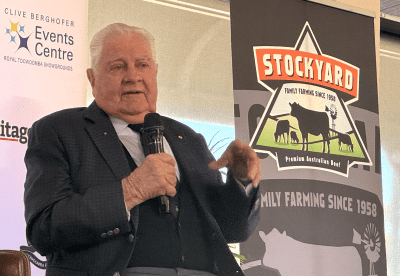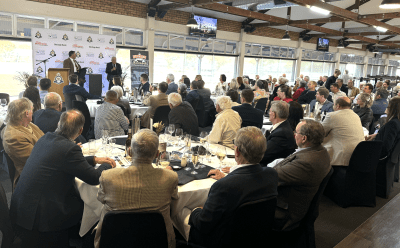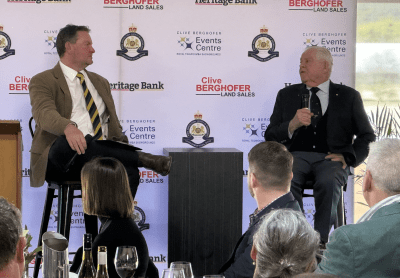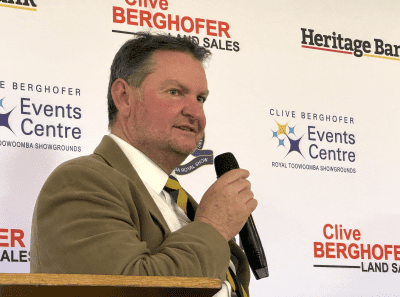High-quality Australian beef exports to Japan are so integral to Australia’s cattle industry today it is easy to forget there was a time before the trade existed at all.
But there was a time when it took risk-taking innovators to travel to the market to learn about Japanese customs and tastes, to create contacts and build relationships, and to develop production systems able to supply the type of beef Japanese customers were seeking consistently, continuously and reliably.
A special lunch hosted by the Royal Agricultural Society of Queensland (RASQ) at the Toowoomba Showgrounds on Friday celebrated the enormous contribution of one such pioneer – Robin Hart AM– and the role he played in the development of both Australia’s high-quality beef export trade to Japan and the Australian feedlot industry.
 From a small grazing property called Kerwee near Eidsvold and then a 200 head feedlot given the same name at Jondaryan in 1965, Robin and his wife Del established Stockyard, which is today a highly-sophisticated and globally recognised Angus and Wagyu feeding operation and exporter of premium beef, and Australia’s most awarded beef brand.
From a small grazing property called Kerwee near Eidsvold and then a 200 head feedlot given the same name at Jondaryan in 1965, Robin and his wife Del established Stockyard, which is today a highly-sophisticated and globally recognised Angus and Wagyu feeding operation and exporter of premium beef, and Australia’s most awarded beef brand.
In an onstage interview with RASQ president Shane Charles, Robin, who is also a former long-serving RASQ president, was quizzed about what it was actually like to have been involved in helping to pioneer a trade now so large and valuable it is of essential importance to every stakeholder across Australia’s vast export-focused beef industry.
Robin grew up in Brisbane and attended a one-teacher school at Ascot where the headmaster who had a dairy background helped to instil in him a strong interest in agriculture and the bush.
Robin’ father Byrne was a well-known Brisbane accountant and the director and chair of numerous companies, including Amagraze, a processing and pastoral business with processing interests in Biloela and Cairns that was exporting mostly “ordinary manufacturing beef” to Japan.
In 1969, Robin was asked to join the Amagraze board, which led to his first visit to Japan – a trip that was to change his outlook on the beef industry.
“I could see here was a race of people who just loved what they ate and chose what they ate and savoured and understood what they ate,” he recalled.
“Here there was a race of people who were really looking for perfection, it certainly changed my way of thinking.”

Guests at Friday’s lunch were served sirloin steaks from Stockyard’s premium Angus 200-day brand Prospect, a new brand launched in January, a natural program (no HGP, no antibiotic) producing high quality beef with a marble score of 5.
As one of the pioneers of Australia’s meat trade to Japan, Amagraze had developed a strong and deep relationship with a trading group in Japan called Nitchiku, which translates to “Japanese meat men”.
During his first visit to Japan, it became immediately apparent to Robin that all the domestic beef he saw was intensively fed, and contrasted dramatically with the beef that was being consigned from Australia by Amagraze and others at the time.
The Australian grassfed product was still selling well, because of Japan’s lingering protein shortage after the war.
A new partnership is formed
Robin said he could see a big future with Amagraze, but when it was taken over by another firm called FJ Walker, which had no plans to continue the same close business relationship with Nitchiku, he proposed a new direct partnership with the trading group.
“People in Japan liked dealing with very much always with the same supplier, and I had formed a good relationship dealing with the Hirai family (which headed Nitchiku).
“So I said ‘look I can’t promise to supply you with the quantities we have been supplying with Amagraze, but what I can do is go back and put together some people who were just starting to get going on the Darling Downs, a few small feedlots that were feeding some cattle for the domestic market, and I said I think I can put them together into a group.
“We wouldn’t be supplying you with manufacturing beef that Amagraze was doing, but I can see what you really require is a better quality product.”
The result was the formation in 1973 of the Stockyard Meat Packers business, an alliance involving three emerging eastern Darling Downs lotfeeders including Dugald Cameron from Aronui feedlot near Bell, Don Bridgeford from Mungala feedlot near Warra, and the Hart family. Uen Morgan’s Lillyvale feedlot outside Condamine joined the group soon afterwards.
Nitchiku was a 20 percent equal partner, with each of the Australian suppliers also holding 20pc of the stock.
The business model was designed to minimise risk, to all parties, by developing ‘back-to-back’ marketing, meaning each consignment was already sold at point of delivery.
Hard work, determination and relationships
Robin said success did not come overnight and it took a lot of hard work and determination to change breeds and get feeding systems to the point where they could provide a consistent product.
“I suppose I realised pretty early in the piece that one of the important things to open up a market and supply someone is to be able supply them on a continuous basis and to be able to continue to supply them with a standard product which was acceptable to them and is consistent.
“And to do that you needed more help than you would ever get from grass country or even growing crops, and that was where feedlotting came in.”
Relationships were “definitely first and foremost” when dealing with Japan, he said.
“To really get somewhere in Japan, you really needed to be introduced to the right people, the correct way through another gentlemen’s contact.
“And once that started the whole thing could then flow on one from another.
“I probably went over 40 times to Japan to personally meet people and shake their hands and try to convince them we could help.
“It is just all hard work, you have to do it, but today it is a lot easier.
One missed opportunity
While his ability to identify and then to supply the type of beef Japanese customers really wanted was central to Stockyard’s success, Robin conceded there was one other early opportunity he did not grasp with the benefit of hindsight – the potential to produce Wagyu cattle in Australia.
 While it was not possible to import Wagyu cattle directly to Australia, he said there were ways to do it, with some leading Wagyu breeders in Japan moving their herds to the northern island Hokkaido, the only island in Japan that permitted the movement of cattle out of Japan to the United States.
While it was not possible to import Wagyu cattle directly to Australia, he said there were ways to do it, with some leading Wagyu breeders in Japan moving their herds to the northern island Hokkaido, the only island in Japan that permitted the movement of cattle out of Japan to the United States.
“That is something I really missed on,” he said.
“Looking at the Wagyu and the way they were producing them in Japan – very much hand fed and handled in doors, I never saw them grazing in Japan,
“To me the Wagyu was a special item, like strawberries and cream, something completely different to beef really, and it had its own market, it was a premium market.
“At the end of the day, it was still beef, I missed the chance to perhaps bring some Wagyu into Australia”.
Proud family tradition
With three generations of his family now in the business, Robin said he was extremely proud of what Stockyard had achieved.
“You couldn’t wish for anything better, having started a business and then seeing the family wanting to continue it on.”
During the question and answer session well-known Darling Downs cattleman, Rod Maclean, asked which of the many changes he had seen in his 70 odd years in cattle and beef production as the one that had made the most important contribution to the industry.
“I think without a doubt grading product,” Robin replied.
“There was a lot of opposition to grading.. but by selecting we’re getting a consistent product and hopefully a consistently good product, and I think that is the thing that helps our product go further.”


Congratulations Robyn on an incredible life developing the cattle industry and creating markets for our product.
Best wishes to Rod Maclean who was there on that journey with you.
Dear sir, much appreciated, great job done by you for coming generations and for their prosperity, prayers for your life and good health Dr Ahmad Kamal Melbourne